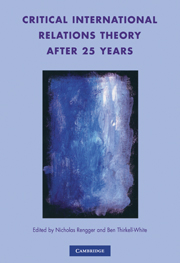Book contents
- Frontmatter
- Contents
- Preface
- Notes on contributors
- Editors' Introduction
- Looking back from somewhere: reflections on what remains ‘critical’ in critical theory
- Transnational theories of order and change: heterodoxy in International Relations scholarship
- Happy Anniversary! Time and critique in International Relations theory
- Is critical theory always for the White West and for Western imperialism? Beyond Westphilian towards a post-racist critical IR
- The promise of critical IR, partially kept
- Towards a sociology of global morals with an ‘emancipatory intent’
- Between Kant and Pufendorf: humanitarian intervention, statist anti-cosmopolitanism and critical international theory
- Index
Looking back from somewhere: reflections on what remains ‘critical’ in critical theory
Published online by Cambridge University Press: 06 July 2010
- Frontmatter
- Contents
- Preface
- Notes on contributors
- Editors' Introduction
- Looking back from somewhere: reflections on what remains ‘critical’ in critical theory
- Transnational theories of order and change: heterodoxy in International Relations scholarship
- Happy Anniversary! Time and critique in International Relations theory
- Is critical theory always for the White West and for Western imperialism? Beyond Westphilian towards a post-racist critical IR
- The promise of critical IR, partially kept
- Towards a sociology of global morals with an ‘emancipatory intent’
- Between Kant and Pufendorf: humanitarian intervention, statist anti-cosmopolitanism and critical international theory
- Index
Summary
Abstract. This article revisits some of the theoretical debates within the field of 1R since Ashley and Cox challenged the mainstream. But in so doing it attempts also to show that the proposed alternatives have their own blind spots that are subjected in the second part to discursive criticism. Neither Ashley's celebration of the wisdom of old realists nor their ‘silence’ on economics, nor the notion of ‘internationalisation of the state’ and of the world order are adequate for understanding politics in the era of globalisation. Instead, a critical theory has to examine the political projects that were engendered by the Hobbesian conception of order and rationality. Highlighting the disconnect between our present political vocabularies and the actual political practices, I argue that a critical theory has not only to ‘criticise’ existing approaches but has to rethink and re-conceptualise praxis, which is ill served by the analytical tools which are imported to this field from ‘theory’.
Introduction
The task assigned to me here is to provide the view of a sympathetic ‘outsider’ assessing the project of critical theory. This charge, entailing some notion of objectivity that one cannot expect from the protagonists engaged in a pitched battle or long drawn out fight, seems fair enough. However, given that it is critical theory which is being discussed, it is somewhat ironic that some notion of scientific detachment and objectivity is invoked, although critical theory has always pointed out that the ‘view from nowhere’ is impossible.
- Type
- Chapter
- Information
- Critical International Relations Theory after 25 Years , pp. 25 - 46Publisher: Cambridge University PressPrint publication year: 2007

